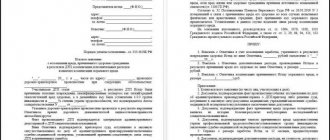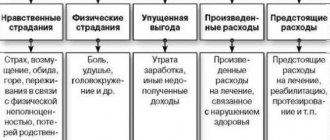How to file a claim for damages
The claim must include information such as:
- information about the addressee : full name for an individual, name for a legal entity, address;
- information about the applicant : full name, address, phone number;
- information about the incident that resulted in damage;
- information about the consequences of the incident;
- information about losses incurred;
- attachment : list of attached documents;
- claim for damages : amount, procedure, terms;
- signature and date.
In addition to damages, the claim may include the following:
- reimbursement of other expenses , for example, for examination or legal services;
- compensation for lost profits , for example, if during illness the victim lost possible income (Article No. 15 of the Civil Code of the Russian Federation);
- compensation for moral damage (Article No. 1099 of the Civil Code of the Russian Federation).
Amount of compensation
The question is of most interest to the victims, but no one can give an exact answer. The fact is that Article 151 of the Civil Code of the Russian Federation states that there is no maximum or minimum amount of compensation for moral damage depending on a particular violation. This means that the victim himself has the right to put forward demands and the amount of compensation. This amount will then be considered in the district court and the judge will grant the claim or deny it.
The amount is determined by many factors. For example, this is the presence and level of guilt of the defendant. There are situations when the defendant would like to change something, but due to circumstances he could not do anything. It also happens, on the contrary, that the defendant deliberately acted against the plaintiff. All features of the case are taken into account.
How to calculate the amount of a claim and what evidence is needed
Damage is calculated based on the characteristics of the object, as well as the damage received. That is, all figures should be documented.
- , which can confirm their value, are suitable as evidence
- In case of harm to health, medical certificates , contracts with medical institutions, and checks are used.
- for calculations in relation to individuals, calculation methods are used based on the employment contract and pay slips of the victim;
- In relation to legal entities, the situation is somewhat more complicated : experts are brought in to create a financial model that can reflect the amount of losses.
In addition, the following documents are attached to the claim:
- results of examinations and expert opinions;
- accident report (in case of an accident);
- contract for legal services (if necessary);
- photographs and videos confirming the damage .
Grounds for claiming moral damages
Moral damage refers to the infliction of non-property harm, expressed in the moral suffering of the victim. However, if material damage is determined simply, then with moral damage everything is much more complicated, since its subjective assessment may not correspond to the objective assessment.
Suppose that a certain citizen does not like the color blue, and this is his subjective taste. When concluding an agreement with a tour operator, a citizen sets a condition - there should be no blue color in his hotel room. The tour operator does not fulfill this condition, and the citizen’s room has blue curtains. The citizen is uncomfortable, but this does not affect his rest or general mood in any way.
Will this cause moral hazard? From the point of view of a citizen - yes, but from the point of view of the tour operator and the judicial authorities - no.
Now let's imagine a situation with the same conditions, but in a slightly different aspect. The citizen warns the tour operator that prolonged exposure to blue light may cause anxiety, which may result in an epileptic attack. This is exactly what happens, the citizen falls, hits his head and ends up in the hospital.
And in this case, the citizen has the right to demand compensation for moral damage.
The difference in approach to seemingly identical situations is explained by the fact that the concept of moral harm in Russian legislation is strictly regulated.
Thus, the causes of moral damage may be:
- violation of the constitutional rights of a citizen;
- death of a loved one;
- loss of the opportunity to live a normal life;
- loss of job;
- negative consequences resulting from the disclosure of medical confidentiality;
- consequences caused by slander;
- physical pain from physical injuries;
- copyright infringement;
- illness caused by negative events.
If we return to our example, it will become clear that the consequences of the second described case fall under the list of possible moral injuries. The discomfort of a citizen in the first case is not one of these.
Sample letter (claim) for damages
The structure of the document can be as follows:
Articles on the topic (click to view)
- How to pay your internet or TTK TV bill without commission?
- Conditions for bankruptcy of individuals
- Article 1484. Civil Code of the Russian Federation. Exclusive right to a trademark
- Sale of apartments at bankruptcy auctions in St. Petersburg
- Trademark cost calculator How much does it cost to register a trademark:
- Who can begin bankruptcy proceedings for a legal entity, what stages does bankruptcy include, and how long do such stages last?
- The cartoons will be examined in court. Trademark owners file thousands of claims in arbitration over the sale of counterfeit goods
- The name and address of the person to whom the claim is being sent.
- The name and address of the sender of the claim, his telephone number and email address.
- A description of the incident that resulted in property damage to the person filing the claim.
- The most detailed description of the consequences of property damage (for example, swelling of the laminate in a specific area as a result of flooding, the impossibility of further operating the car without replacing specific parts for a certain amount, etc.).
- Links to the relevant provisions of the law (including Articles 15, 1064, 1068, 1079 of the Civil Code of the Russian Federation, Article 14 of the Law of the Russian Federation “On the Protection of Consumer Rights” dated 02/07/1992 No. 2300-I, etc.).
- A list of the types of damage, losses and expenses for which compensation is required by the claimant, as well as their amounts. For example, in addition to property and moral damage, you can demand compensation for the costs of conducting an examination, legal services, etc.
- Indication of the deadlines and procedure for sending a response to the complaint.
- Indication of the terms and procedure for compensation of damages.
- Signature of the submitter of the claim and the date of its submission.
- List of applications. It is recommended to attach to the claim copies of documents that can confirm the fact of damage and its connection with the incident described in the claim, as well as the amount of damage caused and other associated losses and expenses. This could be an accident report, a certificate from a medical institution, an appraiser’s (expert) opinion, an agreement for the provision of consulting services, photographs of damaged property, checks, etc.
For information on how to file a claim against the carrier for compensation for cargo damage, read the ready-made solution from ConsultantPlus. You can sign up for a free trial access to the K+ system using this link.
How to make a claim
All issues regarding compensation for property and non-property damage are considered on the basis of the Civil Code of the Russian Federation. It is stated here that property damage is fully compensated. The claim itself is a kind of complaint, which indicates which human rights were violated, and also puts forward a demand for the restoration of these rights.
A complaint is written against an organization where a person was provided with a low-quality service or sold a low-quality product. The claim is written to the director of the organization.
Let's look at the information that needs to be included in the complaint:
- Full name of the organization and exact address of the recipient of the complaint. Initially, the full name should be indicated, and then generally accepted abbreviations are used in the text;
- Full name, address and contact details (usually telephone number) of the claim maker;
- Provide reliable facts of violation of rights. These may be documents, acts and other papers, as well as testimony of witnesses;
- Links to legislative acts. Every violation must be “attached” to some law or article. It is very important to indicate what exactly was violated;
- The amount that the sender wants to compensate for the damage he received as a result of the provision of a poor-quality service, or as a result of the purchase of a low-quality product;
- Date and signature of the sender. Without this clause, the application will be considered invalid.
Important! In addition to writing the complaint itself, you should attach all documents that confirm the fact of causing property and non-property damage to the injured party.
These documents usually look like this:
- Photocopy of passport. A double page with a photo is required, as well as registration. If the victim is a child, then a photocopy of the birth certificate;
- Audio and video recordings that can prove guilt;
- Photographs that can prove guilt;
- If the victim died, then a death certificate is provided;
- Extracts from medical institutions, as well as receipts for the purchase of medicines during treatment;
- Written statements of witnesses with their data and signatures;
- Confirmation of job loss due to the current situation;
- Other documents that prove the defendant's guilt.
ATTENTION! View a completed claim form for moral damages:
Who is making the claim?
Most often, the claim is made to the person or organization responsible for causing the damage. The addressees of the claim may also be:
- parents (guardians, adoptive parents) of a minor guilty of causing damage;
- parents (guardians, adoptive parents) of the person guilty of causing damage, but declared insane;
- employer of the person responsible for causing the damage. Such claims are made if the damage was caused by a person who was performing his official duties (a tractor driver who mistakenly demolished a flowerbed, a trolleybus driver found guilty of an accident, etc.);
- the owner of a source of increased danger (as a rule, this happens when recovering damages for an accident when the person responsible for the accident was driving someone else’s car);
- parent organization in cases where damage was caused by a subordinate entity (branch, department);
- government agency in cases where damage was caused by a government employee (for example, during illegal detention).
In what cases is a claim for damages made?
Most often, the purpose of filing a claim is to try to resolve the issue with the other party at the pre-trial preparation stage. At the same time, the parties can significantly save on legal costs if compensation for damage is made voluntarily. The second party must be aware that filing a claim does not relieve it of the obligation to pay material compensation for the damage caused.
What is the relationship between damage to tangible and intangible property? Most often, a well-drafted claim allows you to significantly save time and achieve results without involving the judiciary. A complaint can be written in the following situations:
- In an accident, when the culprit caused damage to the car of the other party due to a violation of traffic rules, which resulted in an accident.
- When damage is caused to property, in an apartment, or a house due to the actions of a guilty person.
- If the apartment is flooded by neighbors. In cases where the bay caused property damage, the guilty citizens must compensate the losses incurred by the injured party. Cash contributions can be made according to a general agreement; it is not necessary to involve the court.
- Compensation for losses in a situation where a person caused a fire.
- Payment of compensation for damage caused during improper fulfillment of one’s obligations. For example, an agreement was concluded with a citizen to carry out repair work, as a result of which property was damaged.
- Legal entities and individual entrepreneurs can write a complaint against their employee who caused the damage. The enterprise regresses, and labor productivity may also fall.
Complaints not always come to fruition. In the event that the payment of damage is not carried out voluntarily by the party, it will be possible to file a statement of claim in court. You can demand subrogation in case of personal injury, loss of cargo during transportation, destruction of non-residential premises (garage) or vehicle.
Should I wait for an answer?
There is a lot of advice on the Internet regarding the time frame within which a response to a claim should be received. However, timing matters then,
when filing a claim is required by law. And even in this case, the lack of a response does not affect the consideration of the case in court.
Expert opinion
Kuzmin Ivan Timofeevich
Legal consultant with 6 years of experience. Specializes in the field of civil law. Member of the Bar Association.
As a rule, responses to claims come from legal entities and government bodies, since the law obliges them to respond to any appeal from citizens within a period of 10 days to 1 month.
Zen! Zen! Zen! Our Yandex Zen channel has even more special legal materials in a convenient and beautiful format. Subscribe now →
_____________ year, you damaged a car of brand ___________, state registration plate “_______________”, which belongs to me by right of ownership, as a result of which you caused the following mechanical damage to the specified car: deformation of the front left door with a violation of the stiffener.
By damaging the car, you caused me significant material damage associated with the repair of the vehicle, amounting to _________ rubles ___ kopecks, which is confirmed by an expert opinion.
Article 1064 of the Civil Code of the Russian Federation provides that harm caused to the person or property of a citizen is subject to compensation in full by the person who caused the harm.
Article 15 of the Civil Code of the Russian Federation provides the following: a person whose right has been violated may demand full compensation for the losses caused to him, unless the law or contract provides for compensation for losses in a smaller amount. Losses are understood as expenses that a person whose right has been violated has made or will have to make to restore the violated right, loss or damage to his property (real damage), as well as lost income that this person would have received under normal conditions of civil circulation if his right was not violated (lost profits).
Thus, the above material costs incurred by me relate to the damage resulting from your commission of the above crime, which is subject to compensation by you in full. The total amount of material damage caused to me by the above-mentioned criminal offense committed by you is _________ rubles.
The current situation caused me great emotional anxiety, as well as moral suffering. To resolve this issue and protect my violated rights, I had to contact various authorities, on which I spent my personal and work time, as well as money.
Article 151 of the Civil Code of the Russian Federation provides the following: “. If a citizen has suffered moral harm (physical or moral suffering) by actions that violate his personal non-property rights or encroach on other intangible benefits belonging to the citizen, as well as in other cases provided for by law, the court may impose on the violator the obligation of monetary compensation for the specified harm.
».
In accordance with Art. 1101 of the Civil Code of the Russian Federation."
compensation for moral damage is carried out in monetary form. The amount of compensation for moral damage is determined by the court depending on the nature of the physical and moral suffering caused to the victim, as well as the degree of guilt of the harm-doer in cases where guilt is the basis for compensation for harm.
When determining the amount of compensation for harm, the requirements of reasonableness and fairness must be taken into account. The nature of physical and moral suffering is assessed by the court, taking into account the actual circumstances in which moral harm was caused and the individual characteristics of the victim.
».
I estimate the moral damage caused to me at ___________ rubles. I believe that this amount can partially reduce the moral suffering that was directly caused to me by the crime.
Based on the above, guided by Art. Art. 15, 151, 1064, 1101 of the Civil Code of the Russian Federation,
1. Pay in my favor in compensation for material damage, funds in the amount of _________ rubles.
2. Pay in my favor in compensation for moral damage caused by the crime, funds in the amount of _________ rubles.
If my proposals are not satisfied within 10 days, I will be forced to go to court with a demand for the recovery of funds, with legal costs charged to your account, and a claim for compensation for moral harm and damages.
In addition, I will be forced to file a complaint with the prosecutor's office regarding this matter.
We kindly request that you send a written refusal regarding the results of consideration of my proposals to the address: ___________________________ (mobile phone: ______________________).
"___" ________________ G. _______________/_____________/
Claim for damages
Grounds that lead to compensation for moral damage
So, in order to understand what amounts should be demanded for compensation for moral damage, first of all, you should understand the concept itself. The concept of moral damage is in the Civil Code of the Russian Federation.
The Civil Code of the Russian Federation states that moral damage is the physical or moral suffering that a person has suffered as a result of the action or inaction of another person. Moreover, these actions or inactions were expressed as attacks on non-property, constitutional or other human rights. Simply put, moral damages are any actions of a person that caused another person to suffer.
Very often during the investigation it turns out that moral damage is not only physical, but also moral suffering. For example, if a beating occurs, then in fact this is physical suffering, which means that a criminal case is initiated. Also, in addition to physical violence, the result of this will be severe depression of a person and this will be moral suffering. These concepts are almost always inextricably linked.
To make it clearer what moral harm is, let’s consider a striking example. For example, a man was murdered, as a result of which the killer was prosecuted and went to jail.
The dead cannot be compensated for moral damage, but his wife and other close relatives suffered serious suffering as a result of the murder, which is regarded as moral damage. This means that the killer, in addition to everything, will have to compensate for moral damage to the relatives of the murdered person.
Note! Article 150 of the Civil Code also states that moral damage is compensated in case of encroachment by third parties on intangible benefits that belong to a person from birth (constitutional rights), as well as on benefits that were acquired by him.
Let's look at the entire list:
- Personal dignity of a person;
- Maintaining a healthy state;
- Medical secrecy. Violation of medical confidentiality is considered as causing moral harm. This promises great compensation;
- Immunity;
- Reputation;
- Personal secret;
- Freedom of movement;
- Copyright;
- Freedom to choose your place of residence.
This list can be continued with all constitutional human rights. For violation of every right, moral damages must be compensated. But it should be noted that in some situations the court often refuses to satisfy the claim, while in others, on the contrary, it is almost always on the side of the victim.
It is important to know! The rights of a deceased person in court can be defended by his direct heirs.
Procedure for filing a complaint
The claim for damages is drawn up in two copies. You can submit a complaint in the following ways:
- hand over personally to the guilty party;
- send by post.
When using the option of sending a claim by mail, you must use a registered delivery and delivery procedure for letters.
If the claim is transferred directly to the addressee, it is necessary to request that the guilty party record the date of its receipt on the copy remaining with the applicant.
How to properly file a claim in court

The statement of claim is drawn up in writing and signed by the plaintiff or his authorized representative. The statement of claim is as follows:
- Full name of the court where the application is being filed;
- Full name of the plaintiff and indication of the actual place of residence at the time of filing the application;
- Full name of the defendant and preferably his place of residence or work;
- The requirements put forward. References to legislative acts are important;
- Evidence of moral damage. This is a description of the situation, as well as the provision of documents;
- Evidence of pre-trial proceedings. This must be written evidence. Without this, the claim will not be accepted;
- List of documents attached to the application.
So, let's look at the list of attached documents:
- Photocopy of the application;
- Photocopy of the applicant's passport;
- Documentary evidence of guilt;
- Receipt for payment of state duty.
Road traffic accident
If, after an accident or car accident, the insurance company underpaid the funds and there was not enough money to repair the car, or the payment was completely refused, you must:
- Order an examination of the damage caused to the vehicle.
- File a claim with the insurance company and offer a voluntary pre-trial resolution of the issue.
- If you refuse to file a claim in court to recover underpaid or unpaid insurance compensation in full or loss of marketable value (TCV).
The vehicle's technical damage occurs due to the deterioration of the appearance and technical qualities of the car after an accident and repair, for example, when using low-quality or “foreign” spare parts. Insurance companies often do not make the required payment under the insurance policy, although the Supreme Court has recognized it as real damage subject to compensation.
Reimbursement of the vehicle must be made not only when making payments, but also when sending the car to a car service center.
Assessment of moral damage
The citizen himself can assess the moral damage caused to him at his own discretion. This is again due to the subjectivity of the assessment.
But for an objective assessment, there is a whole gradation of moral suffering.
Thus, moral suffering is diversified in accordance with the list given below:
- minor suffering, that is, those that cause discomfort for a short time without affecting the quality of life;
- average suffering, which, although it causes long-term psycho-emotional distress, does not affect the quality of life in terms of consequences;
- severe suffering that may cause mental disorders and require medical treatment;
- extremely severe suffering that destroys the personality, with the subsequent development of mental disorder;
- suffering that causes personality disintegration.
As we can see, the gradation is based on the following evaluation criteria:
- intensity of suffering;
- duration of suffering;
- consequences of suffering.
Returning again to our example, we can try to evaluate the moral suffering of the heroes of the example.
So, the first citizen, although he experienced discomfort, did not suffer, because he did not interrupt his vacation, did not try to change his number, and did not contact the operator. It would be a stretch to classify his discomfort as minor suffering if he could prove that he went swimming in the sea in a bad mood because of the blue curtains.
The second citizen, because of the blue curtains, interrupted his rest and was forced to be treated in the hospital. His suffering can be classified as moderate suffering.









